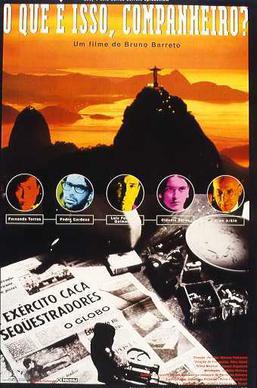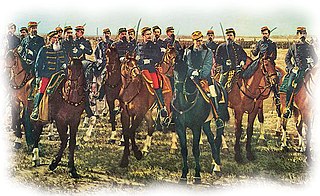Related Research Articles

Survival International is a human rights organisation formed in 1969, a London based charity that campaigns for the rights of indigenous and/or tribal peoples and uncontacted peoples.

Luís Carlos Prestes was a Brazilian revolutionary and politician who served as the general-secretary of the Brazilian Communist Party from 1943 to 1980 and a senator for the Federal District from 1946 to 1948. One of the leading communists in Brazil, Prestes has been regarded by many as one of Brazil's most charismatic yet tragic figures for his leadership of the 1924 tenente revolt and his subsequent work with the Brazilian communist movement. The 1924 expedition earned Prestes the nickname The Knight of Hope.

Operation Condor was a United States–backed campaign of political repression and state terror involving intelligence operations, CIA–backed coup d'états, and assassinations of left-wing socialist leaders in Latin and South America from 1968–1989. Highly publicized events such as the assassination of Cuban revolutionary Che Guevara by CIA–backed Bolivian forces in October 1967 have been perceived as catalysts that predated the operation. Operation Condor was officially and formally implemented in November 1975 by the right-wing dictatorships of the Southern Cone of South America.

The Dirty War is the name used by the military junta or civic-military dictatorship of Argentina for the period of state terrorism in Argentina from 1974 to 1983 as a part of Operation Condor, during which military and security forces and death squads in the form of the Argentine Anticommunist Alliance hunted down any political dissidents and anyone believed to be associated with socialism, left-wing Peronism, or the Montoneros movement.

The military dictatorship in Brazil occasionally referred to as the Fifth Brazilian Republic, was a governmental structure established on 1 April 1964, after a coup d'état by the Brazilian Armed Forces, with support from the United States government, against President João Goulart. The Brazilian dictatorship lasted for 21 years, until 15 March 1985. The military coup was fomented by José de Magalhães Pinto, Adhemar de Barros, and Carlos Lacerda, then governors of the states of Minas Gerais, São Paulo, and Guanabara, respectively. The coup was planned and executed by the most senior commanders of the Brazilian Army and received the support of almost all high-ranking members of the military, along with conservative elements in society, like the Catholic Church and anti-communist civil movements among the Brazilian middle and upper classes. The United States State Department supported the coup through Operation Brother Sam and thereafter supported the regime through its embassy in Brasilia.

Ipanema is a neighbourhood located in the South Zone of the city of Rio de Janeiro, Brazil, between Leblon and Arpoador. The beach at Ipanema became known internationally with the popularity of the bossa nova jazz song, "The Girl from Ipanema", written by Antônio Carlos Jobim and Vinícius de Moraes.

Imagining Argentina is a 2003 drama historical film written and directed by British playwright Christopher Hampton and starring Antonio Banderas, Emma Thompson, Leticia Dolera and Rubén Blades. It is based on the award-winning eponymous 1987 novel by American writer Lawrence Thornton. It was nominated for the Golden Lion at the 2003 Venice Film Festival.

Sir Christopher James Hampton is a British playwright, screenwriter, translator and film director. He is best known for his play Les Liaisons Dangereuses based on the novel of the same name and the film adaptation. He has thrice received nominations for the Academy Award for Best Adapted Screenplay: for Dangerous Liaisons (1988), Atonement (2007) and The Father (2020); winning for the former and latter.

Four Days in September is a 1997 Brazilian thriller film directed by Bruno Barreto and produced by his parents Lucy and Luiz Carlos Barreto. It is a dramatized version of the 1969 kidnapping of the United States Ambassador to Brazil, Charles Burke Elbrick, by members of Revolutionary Movement 8th October (MR-8) and Ação Libertadora Nacional (ALN).

Carlos Marighella was a Brazilian politician, writer, and militant of Marxist–Leninist orientation. Critical of nonviolent resistance to the Brazilian military dictatorship, he founded the Ação Libertadora Nacional, a Marxist–Leninist urban guerrilla group, which was responsible for a series of bank robberies and high-profile kidnappings. He was killed by police in 1969 in an ambush. Marighella's most famous contribution to revolutionary literature was the Minimanual of the Urban Guerrilla.

The Conquest of the Desert was an Argentine military campaign directed mainly by General Julio Argentino Roca in the 1870s with the intention of establishing dominance over the Patagonian Desert, inhabited primarily by indigenous peoples. The Conquest of the Desert extended Argentine territories into Patagonia and ended Chilean expansion in the region.

8th October Revolutionary Movement was a Marxist political organization that took part in armed struggle against the Military dictatorship in Brazil. It was formed in 1964 among college students in the city of Niterói, in the state of Rio de Janeiro, originally being called Rio de Janeiro Dissidence (DI-RJ). It was later renamed in memory of the day in which Ernesto "Che" Guevara was captured in Bolivia, on 8 October 1967.
Christian Federico von Wernich is an Argentine Roman Catholic priest and a former chaplain of the Buenos Aires Province Police while it was under the command of General Ramón Camps, during the dictatorial period known as the National Reorganization Process (1976–1983). Wernich worked in Miguel Etchecolatz's Direction of Investigations of the provincial police with the rank of Inspector. He became internationally known in 2006 after being indicted for murder and kidnapping in aid of the military junta; he was convicted at trial in October 2007 and sentenced to life imprisonment.
Rat torture is the use of rats to torture a victim by encouraging them to attack and eat the victim alive.

The National Liberation Action was a Marxist-Leninist urban guerrilla group in Brazil that opposed the Brazilian military dictatorship. The organization was founded by Carlos Marighella in 1967, following a split in the Brazilian Communist Party. It was the main left-wing armed organization in Brazil, standing out for the amount of militants it managed to attract. During its active years, the ALN was responsible for several notable acts, including bank robberies to finance guerilla warfare, the 1969 kidnapping of the United States Ambassador to Brazil, and taking other public figures hostage to be exchanged for jailed militants.

Carlos Lamarca was a Brazilian Army Captain who deserted to become a member of the armed resistance to the Brazilian dictatorship. He was a part of the Popular Revolutionary Vanguard and became, along with Carlos Marighella, one of the leaders of the armed struggle against the military dictatorship. Such groups were armed chiefly for self-protection from the Right-wing dictatorship that unleashed state terrorism against any who opposed their regime, including students, the clergy, and the children of those who called for democracy. The kidnappings by a few armed groups were conducted to free comrades suffering extremely brutal torture in Brazil's prisons.
The genocide of indigenous peoples, colonial genocide, or settler genocide is the elimination of entire communities of indigenous peoples as a part of the process of colonialism. Genocide of the native population is especially likely in cases of settler colonialism, with some scholars arguing that settler colonialism is inherently genocidal.
The Figueiredo report is an investigative report by public prosecutor Jader de Figueiredo Correia, published in 1967, detailing the crimes committed by the Indigenous Protection Service against the native peoples of Brazil. The report had been commissioned by Minister of the Interior Albuquerque Lima, but had minimal repercussions for those involved. The report uncovered numerous incidents of genocide, torture, abduction, enslavement, biological and chemical warfare, sexual abuse, and land theft committed upon the indigenous peoples in Brazil, thereby documenting in part the genocide of indigenous peoples in Brazil.

Raymundo Gleyzer was an Argentine screenwriter and filmmaker. He specialized in documentaries and politically charged fiction films. Gleyzer was part of the left-wing faction of the Peronist political movement, and a staunch opponent of Argentina's last military dictatorship (1976-1983). In 1976 he was kidnapped, likely murdered and disappeared as part of the dictatorship's campaign of State-sponsored terrorism.
The 1969 kidnapping of the United States Ambassador to Brazil was the kidnapping of Charles Burke Elbrick by the National Liberation Action (ALN) and the October 8th Revolutionary Movement (MR8) in protest of the US-backed military dictatorship. Fernando Gabeira and Virgílio Gomes da Silva helped plan and execute the operation. In order to begin negotiations, the kidnappers demanded that their letter-manifesto be read and printed in the media, which was done. The ambassador was released after 78 hours in exchange for the release of 15 political prisoners imprisoned by the military dictatorship, who were exiled to Mexico. It was among the most high-profile guerrilla actions taken against the military dictatorship (1964-1985).
References
Notes
- ↑ Holland, Peter (1 January 1979). "The Director Intervenes: Christopher Hampton's "Savages"". Comparative Drama. 13 (2): 142–149. doi:10.1353/cdr.1979.0014. JSTOR 41152827.
- ↑ Production details http://www.michaelpennington.me.uk/page173.html
- ↑ "Savages: A Play in Two Acts" Google Books
Further reading
- Hampton, Christopher: Introduction. In: Savages, London: Faber and Faber, 1974.